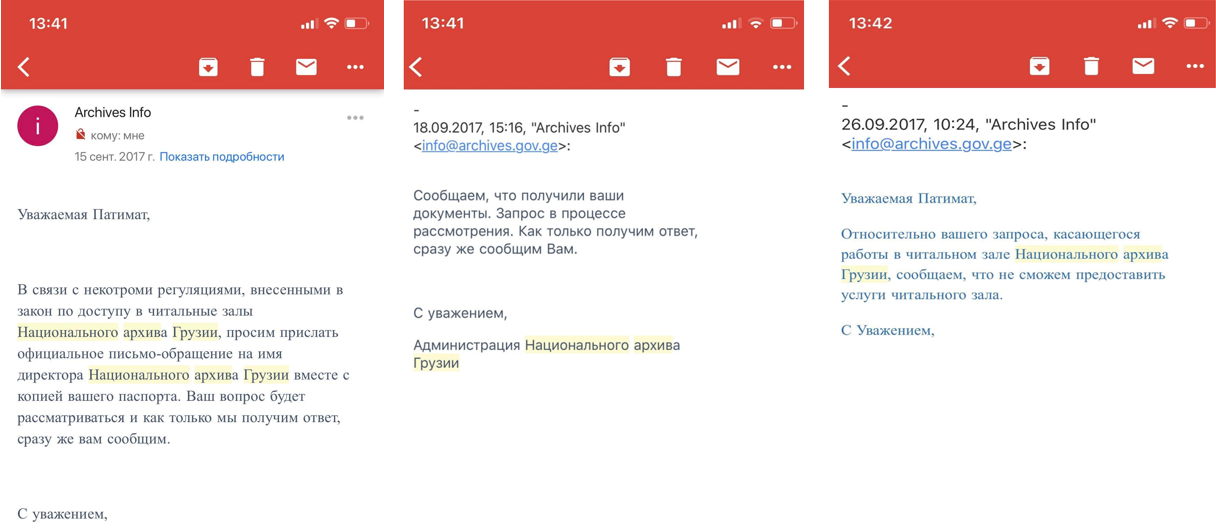


 In the decision of April 4, 2019, the Tbilisi City Court fully granted the appeal of the Institute for Development of Freedom of Information (IDFI) against the National Archives of Georgia – LEPL of the Ministry of Justice of Georgia. The court ordered the respondent party to disclose information on the number of applications received with the request of accessing archival documents and relevant decisions taken. The National Archives of Georgia was directed to disclose the information even though they did not process the statistical data requested by IDFI.
In the decision of April 4, 2019, the Tbilisi City Court fully granted the appeal of the Institute for Development of Freedom of Information (IDFI) against the National Archives of Georgia – LEPL of the Ministry of Justice of Georgia. The court ordered the respondent party to disclose information on the number of applications received with the request of accessing archival documents and relevant decisions taken. The National Archives of Georgia was directed to disclose the information even though they did not process the statistical data requested by IDFI.
This dispute is of crucial importance for several reasons. First, the court ordered the administrative body to create and disclose statistical data; Secondly, the Court stressed that public access to archival documents was of utmost importance in a democratic society; And thirdly, during the court hearings, the practice of systematic breach of legislation (General Administrative Code of Georgia) was revealed in the National Archives of Georgia.
Initially, the National Archives of Georgia did not respond to our Freedom of Information (FOI) request even after the expiration of the maximum ten days period foreseen by the applicable legislation. Receiving a response from the entity was possible with the delay of four months after the National Archives of Georgia was informed that a complaint was filed against it at the Court. At the same time, the Ministry of Justice of Georgia refused to review the administrative complaint filed by IDFI against the National Archives of Georgia. The refusal violated applicable legislation. The Ministry of Justice has the responsibility to supervise the legitimacy, expediency, and efficiency of the activities carried out by the National Archives of Georgia.
Arguments of IDFI and the National Archives of Georgia
The openness of archives is a major challenge in modern society. It is directly related to freedom of information, democratization, internalizing of the past (especially the Soviet period) and formation of a collective memory of the nation. During the course of the past two years, multiple individuals stated that they were not granted access to the reading hall of the National Archives of Georgia and they did not receive any justification for the refusal. [1] [2] Several persons referred the problem to IDFI.
See Example: Scientist Patimat Takhnaeva's referred to the National Archives of Georgia. The scientist was denied access to the reading fall of the National Archives of Georgia. The National Archives did not explain the grounds for refusal.

The main aim of the strategic litigation conducted by IDFI was to study the scope of the problem described above. With the purpose, IDFI requested information on the number of applications received by the National Archives of Georgia and relevant decisions taken.
The National Archives of Georgia refused to disclose the information, indicating that the entity did not process complete information on the application received and relevant decisions taken.
The Court decision
The Court referred to the Constitution of Georgia, the General Administrative Code of Georgia and the Law on the National Archives of Georgia and ordered the entity to disclose information on the access to the national archival funds.
The court pointed out that the information requested by the IDFI did not include closed public information prescribed by the Georgian legislation, i.e., state or commercial secrecy or personal data.
The Court did not share the position of the respondent party and noted that the National Archives had the obligation to disclose the information based on the data stored at the entity. The Court further elaborated that the argument that the National Archives of Georgia did not systematically record received application and relevant decisions could not be used as a valid justification for refusing to disclose the information. The National Archives of Georgia was obliged to provide information even considering the fact that only a small share of the applications and relevant decisions were kept at the entity.
Systemic Legal Violations Identified During the Dispute
The activity of an administrative body in a state of law is bound by applicable legislation and its rights and obligations are determined by specific legal acts. The General Administrative Code of Georgia establishes the types of administrative proceedings, their stages, and obligations of state entities and private persons. During the course of the dispute the National Archives of Georgia violates numerous obligations imposed on it by the General Administrative Code of Georgia, namely:
- The National Archives of Georgia does not fully record received applications and relevant decisions
According to the respondent party, the National Archives of Georgia did not have a formalized, structured system of recording and storing received applications. This was confirmed by the representatives of the National Archives of Georgia during the court hearings.
- The National Archives of Georgia manifestly violates the obligation to issue decisions on the refusal to grant access to the Archival funds in written form
In accordance with the applicable legislation (Article 51 (2) of the General Administrative Code of Georgia), if a decision made by an administrative body restricts the legal rights of a person, it shall be issued in writing within the period of three days. During the course of the proceedings, the representatives of the National Archives of Georgia emphasized that the decisions on refusing access to the archival funds were rarely issued in writing when applicants themselves requested to be provided with written refusals. Thus, based on the practice implemented at the National Archives of Georgia, the decisions to limit access to the national funds are issued in writing in exceptional cases.
- The National Archives of Georgia does not inform applicants of their right to appeal and relevant procedures
Based on the Georgian legislation (Articles 52 (2) and 45 of the General Administrative Code of Georgia), each decision of an administrative body restricting legitimate rights of a person, must include information on the appeal procedures, the title of the entity where an appeal can be filed, its address and the deadline for filing an appeal. According to the representatives of the National Archives of Georgia, the applicants, when they were informed of the refusal to access the archival documents, were not given a clarification on the rules and procedures of the appeal.
The National Archives of Georgia is an entity that stores the largest part of the National Archival Fund. The entity is granted responsibility to ensure access to the funds, manage archival documents and further develop the national archives. As described above, it is highly problematic that the National Archives of Georgia is manifestly violating the obligations imposed on it. In addition, the entity refused to comply with the court decision and referred to the Appellate Court of Tbilisi, thus continuing to violate the right of IDFI to receive open public information.
The Court decision constitutes an important step towards reducing the deficiencies present at the National Archives of Georgia. However, the court decision only regulates the relations related to the particular case. In order to solve the systemic problems, it is necessary to introduce amendments to the legislation regulating the activities of the National Archives of Georgia. For this purpose, on April 10, IDFI submitted a legislative proposal to the Parliament of Georgia. We hope that the access to the archival documents in Georgia will increase as a result of the activities and advocacy of IDFI.